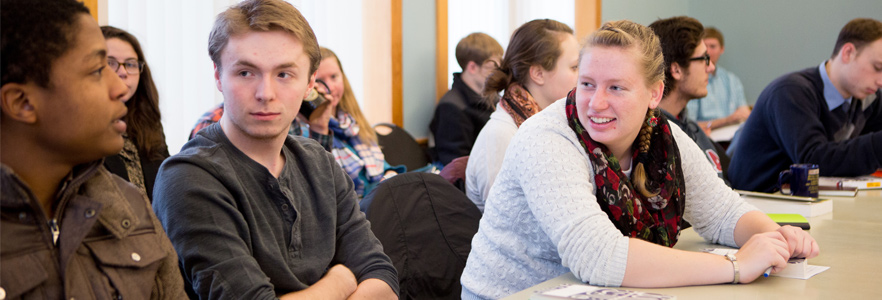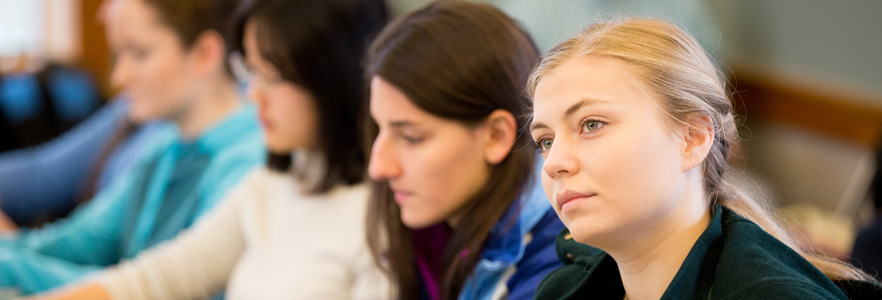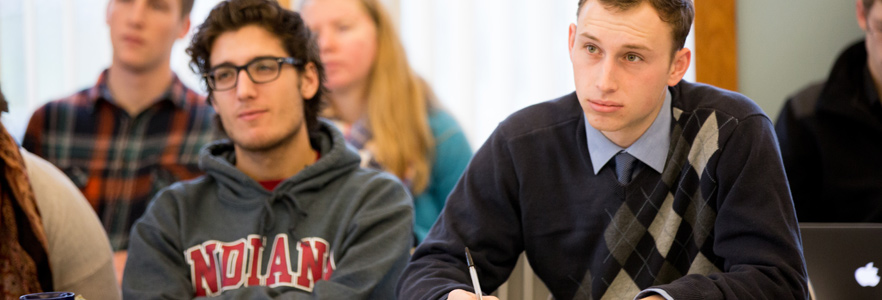Essay Contest
Each year, STILLPOINT and the Jerusalem and Athens Forum sponsor an essay contest open to all past and current students of the program. Topics are chosen that challenge students to address an important current issue in light of reading and seminar discussions. A winner is chosen and awarded $100 and their essay is published in the fall edition of Gordon's STILLPOINT Magazine. Please find the current winning essay below and visit the contest archives to read essays from previous winners.
2024 Winner
"Though We are One, Don't Forget That We are Many" by Giovanna Johnson '26
I used to feel like I was doing faith wrong. Honestly, sometimes I still do. Going to a Christian college and being surrounded by Christ followers has been such a blessing however, it has simultaneously been one of the most challenging environments I have spent an extended amount of time in. Christian life at Gordon often features morning chapels filled with students raising their hands to the heavens during the familiar songs being played late-night chapel services filled with peers dancing with all their might; and many an Instagram caption of a Gordon student exuding the essence of “being filled with the Spirit” through diction boiling down to being “on fire” for Jesus.
I consider myself a generally reserved individual. I have never raised my hands above my ribs during a worship set; I have never resonated with many modern, poetically-inclined K-Love lyrics about opening up my heart, shouting to the Lord or any lyric about feeling God’s presence in a given moment; and I have never felt the rush of the Holy Spirit other than when I am being convicted of my sin. While others may feel led to pray aloud with hands laid on another’s shoulders, I feel safely held in the arms of the Good Shepherd when I pray quietly and stoically. I have always been an introvert––I do not thrive in large groups, let alone express my innermost emotions in public––and coming to a Christian college in which many of those around me resonate with the very things I do not, I began to question whether I was “doing faith” right in the first place.
Am I enthusiastic enough?
Do I even have the joy of the Lord?
Do I have enough of the Spirit?
Am I even saved?
These thoughts have all, in some capacity, consumed my mind at one point or another. I have known, believed and loved the Gospel from a young age and have been continually striving to cast myself at the feet of Jesus. But seeing this enthusiasm I had never before encountered spurred me to worry that my faith was hollow and I was actually deceived about being saved because I was not “feeling” as much as others seemed to.
In time I have been learning how to process my fretting through Scripture. I have sought comfort and stability from the promises of old and have worked to apply them to these worries. One passage that is applicable to this is Psalm 139. David writes:
“You have searched me, LORD, and you know me. You know when I sit and when I rise; you perceive my thoughts from afar. . . Where can I go from your Spirit? Where can I flee from your presence?. . . For you created my inmost being; you knit me together in my mother's womb. . . Search me, God, and know my heart; test me and know my anxious thoughts. See if there is any offensive way in me, and lead me in the way everlasting” (Psalm 139:1-2, 7, 13, 23-24 NIV).
Scripture promises that the Lord knows me, all of my anxiety and overthinking included. He understands my thoughts and even "before a word is on my tongue" knows it completely (Psalm 139:4 NIV). I do not have to search for his presence through a worship set or feelings of being on fire for Jesus, as he is ever-present and is ever-sanctifying me (1 Thessalonians 5:23 NIV). Even further, I have been made just like this, as much of a reserved worshiper as I am. He knows my heart and convicts me of my sin and leads me to everlasting life.
Grounding myself in these Biblical truths reminds me that I need not fret over my salvation or whether I am "doing faith wrong." Just as the Lord has made me introverted by nature, he has made others in their unique personalities, too. The Lord seems to reach me in quieter moments, just as he reached Elijah in a whisper on the mountaintop (1 Kings 19 NIV). The Lord may reach others in louder moments, and they may express their devotion more enthusiastically, and those manifestations of faith are just as valid.
As the Creator he knows our hearts. Therefore, there is no one-size-fits-all style of worship to prove we have received the Gospel. I have nowhere near perfected the practice of combatting my self-doubts with scriptural truths; however, God does not expect my perfection. Similarly, God does not expect a cookie-cutter understanding and style of worship. Yes, the Church is one, but within the church we are many, and there is beauty to be found in these differences. May we sing (however loudly or quietly we choose) the praises of the all-knowing and all-loving Father.
Runner Up
"The One and the Many: Juggling Cultural Identity in Larger Society" by Abi Eisner ’25
I hate the zoo.
There's something about seeing the animals behind bars, the crowds staring and pointing at them as they sit trapped under a hundred eyes, that reminds me too much of my own childhood. I grew up in the Central American country of Guatemala and was one of the few white people that lived in our community. Whenever we went we were the object of spectacle, our hair was pet, our pictures taken and our skin touched. A thousand opinions and identities were put on us, the "gringos," before we even spoke.
In Guatemala I was too white to fit into the Hispanic culture. Once I moved back to the United States I was too “Guatemalan” to fit into American culture. I found myself with a unique cultural identity, a special mix of each world that left me feeling out of place in both. This state of cultural homelessness has been a point of constant reflection as I’ve ventured into adulthood, trying desperately to figure out which world I belong to.
Hannah Arendt, a political theorist famous for her book The Human Condition, provides a different perspective on the source of one’s personal identity, rendering this question obsolete. Arendt holds that, according to biology, there is little distinction between each of us, and that “if this inside were to appear, we would all look alike.” For Arendt there is something common across all of humanity, something inherent in our scientific “humanness” that unites people, even from various homes and backgrounds. We have a unity that transcends the cultural differences that may cause separation, and it’s found at the very basic biological level.
She also draws an important distinction between the way identity functions in the private world and the public world. The self in the private sphere is focused on sustaining life and can be complacent or afraid to enter the public world. It isn’t until the self exits the private and enters the public through action that we learn “who” we are. As long as we remain in private, we can only know “what” we are. That “what” is determined by the various roles that society places on us, qualities, talents or shortcomings that we either hide or show proudly. It is through words and actions that humans show their true character and their unique personal identities. Identity is found in your actions, far more than any cultural expectations or traditions.
Arendt’s ideas become especially interesting when we bring them into the conversation of “The One and the Many.” To juggle your cultural identity in a larger society, you first must understand that your identity is not determined by the role that society places on you, but rather by your actions within that society. That is what allows you to move away from a “what” and become a “who.” It is through being a part of the Many that you become One.
This kind of thinking opens up the door for an identity that can travel between cultures and backgrounds, unchanged. Our actions reflect the unique identity of who we are, and the inability to determine the One apart from the Many is a trait that is common to all of humanity. An identity that is rooted in one’s actions in public can be translated from one sphere to another and allows for a definition of identity that is impervious to differences that normally cause separation. It even includes those who don’t understand what “Many” they belong to, those told their “One” is too culturally complicated for any world.
As Arendt says, we are all biologically human. More than that, each of us has an identity that can only be revealed as we act beyond our private selves. It is through these realizations that we can let go of our need to determine what world we belong to. The question of our “who” is not determined by our culture, but rather by the kind of person we choose to be, the character we strive to have and the actions that reflect those choices.
Runner Up
"Many Voices, One Sound: An Ecumenical Vision of Hope" by Eliza Weigelt '25
In a multidenominational context like Gordon, the ways we engage in congregational worship are often varied and can easily become points of contention where diverse, strong opinions come into conflict. As a music major interested in sacred music history and a Chapel worship leader, I’m often more aware of these conversations than most, but I have also noticed a curious trend. There is one hymn that transcends the divisions and is sung with enthusiasm and joy in nearly every context on campus where it appears: what we commonly refer to as “The Doxology.”
There are, of course, many doxologies found throughout Scripture and in hymnals, but the one I’m referring to is sung to the tune “Old 100th.” Composed by Louis Bourgeois in 1551, “Old 100th” was originally used for a setting of Psalm 134 in French for the Genevan Psalter, but adopted its current name when it was first used with English text for William Kethe’s 1561 hymn “All People That on Earth do Dwell,” based on Psalm 100. Anglican bishop Thomas Ken paired the tune with the text we know today in his 1695 hymn “Awake My Soul and with the Sun.”
Today at Gordon the Doxology is sung in many times and places, most notably for me each Sunday evening in the Chapel at the close of Catacombs and in Frost 206 on Tuesdays and Thursdays at the end of each JAF class. It has become a definitive part of our cohort’s rule of communal living to always end time spent together pursuing Truth by praising the Source, most movingly at the end of the 20th Annual JAF Debate, along with everyone in the audience, after debating whether the concept of human dignity can be supported apart from a religious or transcendent justification. This recurring experience has captured my imagination over the course of this year––many voices joining together in one sound of a hymn of praise to the Three-in-One.
In Revelation 7 John describes “a great multitude that no one could count, from every nation, from all tribes and peoples and languages, standing before the throne and before the Lamb, robed in white, with palm branches in their hands” who join angels and elders in singing praise to God. Here at Gordon we get a foretaste of this each time we sing the Doxology. Though its history has it firmly grounded in the Protestant tradition, it has become a symbol of our ecumenical character.
As a JAF student it has been such a privilege to engage with the concept of “The One and the Many” this year through our class discussions, CFI lectures, the debate and Symposium Day and to ponder how diversity, unity and our current pluralistic society exert influence over topics of hospitality, generosity, creation care, theology in relationship to lived experience, American Christianity, racial diversity in institutions, defining and affirming human dignity and so much more. In the process of engaging with so many different facets of “The One and the Many,” I found myself continually asking, “Is there a way our many-ness could ever be reconciled into one-ness that still reflects the beauty of diversity that we’ve been created with?”
Regardless of the context there is always one answer I come to: the Church.
Not quite the church as we see it on earth today––riddled with division, driven by political agendas, argumentative over doctrinal issues, plagued by pitfalls of materialism––but rather one, ecumenical Church that recognizes there is wisdom to be found in each of her many traditions. A Bride who, knowing there is a wedding feast to celebrate when her Bridegroom returns and makes all things new, takes loving care of the earth and cherishes the beautiful diversity it houses. A Bride who, as T. S. Eliot describes in Four Quartets, is “still and still moving/Into another intensity/For a further union, a deeper communion.” A Bride who finds her unity in worshipping her Beloved.
We set the table for a feast that is already here but also not yet fully realized. There is much work to be done: peacemaking, stewardship, practicing creativity, helping to usher in the Kingdom of God.
As we work in joyful anticipation of what is to come, I will continue to sing these lines as a prayer over our world:
Praise God, from whom all blessings flow,
Praise Him, all creatures here below,
Praise Him above, ye heav'nly host,
Praise Father, Son, and Holy Ghost!
Amen!
I hope you’ll join me.




 Jerusalem and Athens Forum
Jerusalem and Athens Forum Essay Contest
Essay Contest


